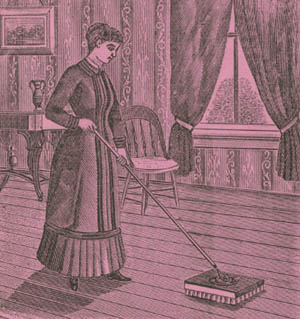 The RBMSCL’s reading room is going to be closed on Monday, May 9th so that we can devote a few hours to a careful cleaning and ordering of our stacks. We’ll reopen again on Tuesday, May 10th at 9:00 AM with everything sparkling and tidy!
The RBMSCL’s reading room is going to be closed on Monday, May 9th so that we can devote a few hours to a careful cleaning and ordering of our stacks. We’ll reopen again on Tuesday, May 10th at 9:00 AM with everything sparkling and tidy!
(Incidentally, doesn’t this homemaker look thrilled with her I-XL Pump Co. Scrubbing Brush? According to the advertising circular, it “takes the cake.” Which we don’t doubt, because who isn’t equally a fan of cake and cleaning products?)
To get ourselves ready for cleaning day, we thought we’d take a look at the suggestions for cleaning and caring for books and libraries that have been offered to industrious homemakers and housekeepers over the years.
Please note that the RBMSCL doesn’t actually use any of these cleaning and care practices, nor do we recommend that you use them on your own books or manuscripts.
“To Prevent Moulding in Books, Ink, Paste and Leather: Collectors of books will not be sorry to learn that a few drops of oil of lavender will insure their libraries from this pest.”
—From The Skillful Housewife’s Book, 1846.
“When a parlor with handsome furniture is to be swept, cover the sofas, centre-table, piano, books, and mantel-piece, with old cottons, kept for the purpose. . . . Dust ornaments, and fine books, with feather brushes, kept for the purpose.”
—From Miss Beecher’s Housekeeper and Healthkeeper, 1873.
“To Preserve Books: Bindings may be preserved from mildew by brushing them over with the spirits of wine. . . . Russia leather which is perfumed with the tar of the birch-tree, never molds or sustains injury from damp. The Romans used oil of cedar to preserve valuable manuscripts.”
and
“To Remove Ink Spots on Books: A solution of oxalic acid will remove them without injuring the print.”
—From Practical Housekeeping, 1883. (With regard to the second piece of advice: now you know why we use pencils!)
“As the library . . . often knows the scent of cigar smoke we would refrain from adding upholsteries to catch and retain the odor, which, while it may not be objectionable at first, is certainly not enjoyable when stale.”
—From Home-Making and Housekeeping, 1889.
“Glazed bookcases are quite unnecessary. . . . Books do not suffer, but rather benefit, by coming into contact with the air. . . . Even if the [library] is not in regular daily use, a fire should be lighted frequently, especially in damp weather; otherwise the books will inevitably be attacked by mildew, and ruined sooner or later.”
—From The Book of the Home, 1900.
“Gum camphor laid among books on the shelves will keep the mice away.”
—From Putnam’s Household Handbook, 1916. (We would like to note how happy we are that we don’t have this problem!)


Fun post, Amy! 🙂 Happy Spring Cleaning on Monday! 🙂
Interesting and funny quotes. I buy newer leather books and fortunately they are very care free.